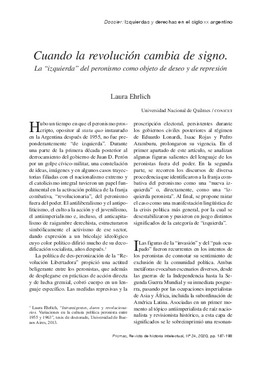Cuando la revolución cambia de signo. La “izquierda” del peronismo como objeto de deseo y de represión
When the revolution changes its meaning. Peronist “Left” as an object of desire
Abstract
El artículo interroga el significado de la atribución de una identidad de “izquierda” a un sector del peronismo, a inicios de la década de 1960 en la Argentina. Se analizan, en primer lugar, algunas figuras del lenguaje del peronismo fuera del poder, para mostrar su original inscripción en una constelación ideológica que era propia, a fines de los años cincuenta, del campo de las derechas del espectro político. En una segunda instancia, se recorren discursos de origen estatal y otros, procedentes de la izquierda partidaria, interpretando que proyectaban una voluntad represiva y un deseo político, respectivamente, al identificar a la franja combativa del peronismo como filocomunista, como una “nueva izquierda” o como la “izquierda peronista”. Al final, se comprende el caso como una manifestación en el plano lingüístico de la crisis política más general, por la cual se desestabilizaron y pusieron en juego distintos significados de la categoría de “izquierda”. This essay focuses on the problem of why certain Peronist activists were told to be “leftist” at the beginning of the sixties in Argentina. In the first section the paper analyzes some rhetorical figures used by Peronist when they were not in power at the end of the 1950s in order to show that they originally belonged to a rightist ideological frame. The second section concentrates on State agents’ and leftist Parties’ discourses referring to militant groups within the Peronism as a “Peronist Left”, a “New Left” or directly as “communist friendly”, and proposes that it was due to both will of repression (the former) and political desire (the latter). Finally, the article proposes the idea that these cases were the linguistic expression of a more general political crisis that displayed multiple and unstable meanings for “Left”.

